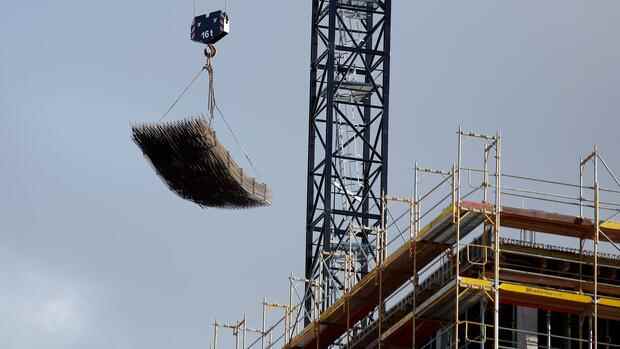A shortage of skilled workers and high raw material prices are a burden on companies.
(Photo: dpa)
Berlin The economic development in Germany is still fraught with many risks. That shows the current economic survey of the German Chamber of Industry and Commerce (DIHK), which was presented on Thursday.
It is true that the assessment of the current business situation has improved compared to the survey from early summer. Almost half of the companies rate their current situation as good, while 14 percent say their business situation is worse. The mood in the construction industry and among service providers is particularly good.
But the risks for your own business are growing, especially with a view to delivery bottlenecks, high energy prices and a lack of skilled workers. In view of the current situation, the DIHK is lowering its growth forecast for 2021, which was three percent in early summer, to 2.3 percent. In the coming year, the organization expects gross domestic product to grow by 3.6 percent.
Of this, however, 1.6 percentage points were attributable to statistical catch-up effects. “The actual growth in the next year amounts to only two percent”, explained DIHK General Manager Martin Wansleben.
Top jobs of the day
Find the best jobs now and
be notified by email.
The entrepreneurs see the greatest danger in the shortage of skilled workers – for the first time since the beginning of the corona crisis. 59 percent cited the shortage of skilled workers as a problem. Up until now, delivery bottlenecks and high energy prices have been the biggest problems facing the German economy. “The hut is on fire for various reasons,” said Wansleben.
Lack of employment migration
There is a particularly shortage of suitable workers in the construction industry. 80 percent of those surveyed in the sector see this as the greatest risk. With service providers it is 60 percent, in trade and industry a little more than half.
According to the Federal Employment Agency (BA), there would be a shortage of 1.2 million skilled workers in Germany, two thirds of them skilled workers. There are staff shortages at specialist level in around 70 professions. This is not a new phenomenon.
The problem has been known for years. During the corona crisis, it has worsened drastically once again. When construction projects were interrupted or the retail trade had to close, the employees turned around because they lost their jobs or were put on short-time work.
“It will certainly normalize a little, but there is a shortage of skilled workers,” said Wansleben. The deficiency particularly affects some areas. “In the end, only immigration helps, and that from non-European countries,” said Wansleben. According to the Federal Employment Agency, 400,000 immigrant workers are needed every year.
There is already a comparatively high amount of labor migration in Germany, but this mainly affects workers from European countries. According to Wansleben, the problem is that these countries are also experiencing a demographic change similar to that of Germany, and thus no one will be helped in the long term.
“We need an offensive here,” demanded Wansleben. The exploratory paper of the SPD, Greens and FDP for a traffic light coalition contains good approaches for this. This applies, for example, to the “lane change”. For example, rejected asylum seekers who are already integrated in the labor market and are about to be deported should be able to receive a residence permit regardless of the status of their asylum procedure. But Wansleben questioned whether that was enough.
More: “The hoped-for final spurt is not coming”: Altmaier lowers economic forecast
